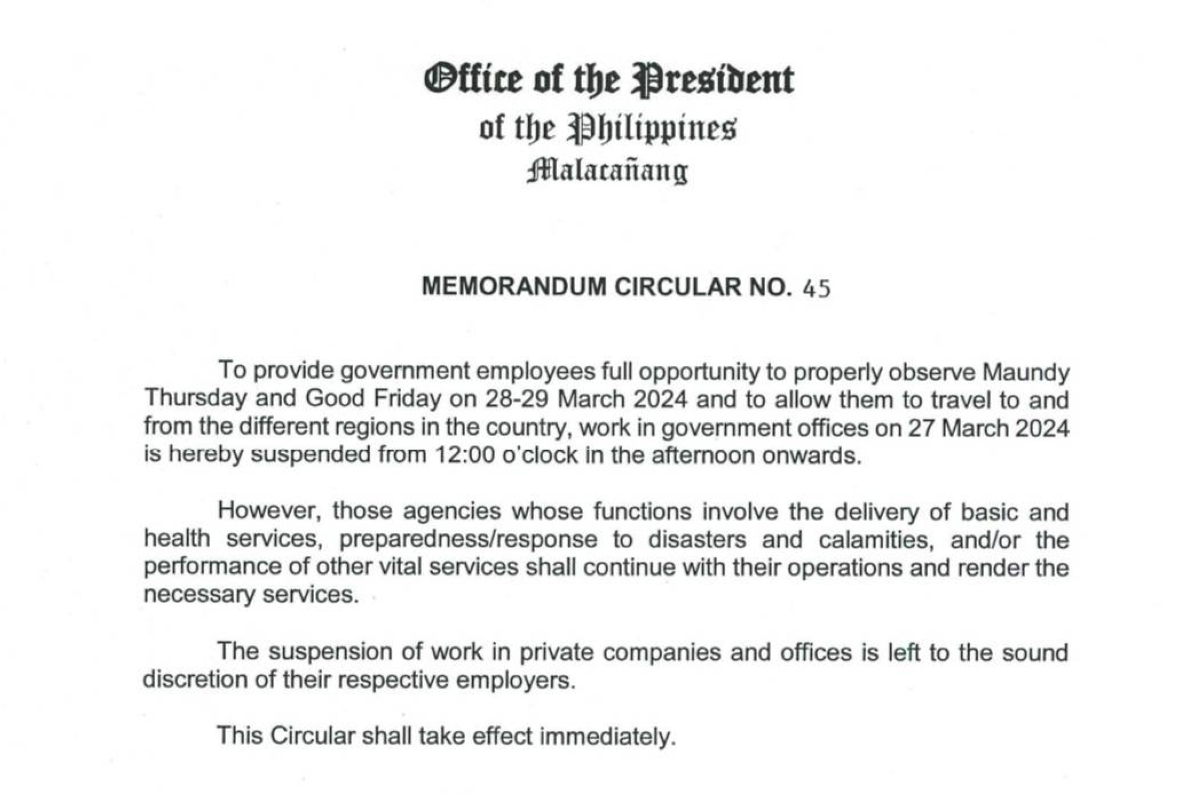In addition to the half-day work schedule declared for government offices on Holy Wednesday
It is important to highlight the significance of this decision in the context of the Philippines’ predominantly Catholic population. Holy Wednesday, also known as Spy Wednesday, marks the day when Judas Iscariot betrayed Jesus Christ, leading to his crucifixion on Good Friday. This day holds great religious importance and is observed with various rituals and traditions.
Recognizing the need for individuals to have sufficient time to prepare for the upcoming Holy Week
The government allows government employees to have a half-day off on Holy Wednesday. This includes attending religious services, participating in processions, and engaging in personal reflection and prayer. The decision to suspend work from 12:00 o’clock in the afternoon onwards ensures that employees have ample time to travel to their respective destinations, especially considering the geographical diversity of the Philippines.
Continuation of essential services during Holy Week
The government’s memorandum circular emphasizes the importance of maintaining essential services during this time. Government agencies responsible for delivering basic and health services, responding to disasters and calamities, and performing other vital functions will continue with their operations. This ensures that the public’s needs are met and that there is no disruption in the provision of crucial services.
Flexibility in private companies and offices
It is worth noting that the decision to suspend work on Holy Wednesday in private companies and offices is at the discretion of the employers. While some employers may choose to follow the government’s lead and declare a half-day work schedule, others may decide to maintain regular working hours. This flexibility allows for different companies to accommodate the religious preferences and practices of their employees.
Recognition of family and community during Holy Week
Moreover, the declaration of a half-day work schedule on Holy Wednesday also recognizes the value of family and community during Holy Week. This time off provides an opportunity for families to come together and participate in religious activities, such as attending church services and joining processions. It allows them to reflect on the teachings of Jesus and strengthen their bonds as a family.
Community events and cultural traditions
Additionally, community events related to Holy Week, such as the “Pabasa” or the continuous chanting of the Passion of Christ, can be organized and attended by government employees during this time. These events not only serve as a way to deepen one’s faith but also foster a sense of camaraderie among the participants. By participating in these activities, government workers can connect with their fellow citizens and contribute to the vibrant cultural and religious fabric of the Philippines.
Religious processions and rituals during Holy Week
Furthermore, the government’s recognition of the importance of Holy Week extends beyond the declaration of a half-day work schedule. The Philippines is known for its vibrant and elaborate religious processions and rituals during this time, particularly in cities such as Manila and Cebu. These processions attract both local devotees and tourists who are interested in witnessing the rich cultural heritage and strong faith of the Filipino people.
Streets come alive with colorful processions
During Holy Week, the streets come alive with colorful processions, where statues of Jesus Christ and the Virgin Mary are paraded through the city. These processions are often accompanied by traditional music, prayers, and hymns, creating a solemn yet festive atmosphere. Many devotees participate in these processions by carrying crosses, wearing penitential robes, or walking barefoot as acts of sacrifice and devotion.
Religious rituals and the “Senakulo”
In addition to the processions, various religious rituals take place throughout Holy Week. One of the most well-known is the reenactment of the Passion of Christ, known as the “Senakulo.” This theatrical performance depicts the events leading up to the crucifixion and resurrection of Jesus and is often staged in churches or open-air venues. The Senakulo is a deeply emotional and moving experience, as actors portray the suffering and sacrifice of Jesus, evoking a sense of empathy and reflection among the audience.
Source: The Manila Times







